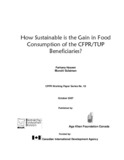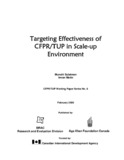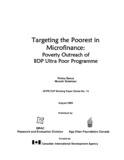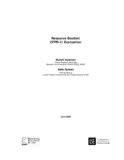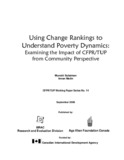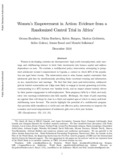Search
Now showing items 1-10 of 27
Impact assessment of CFPR/TUP: A descriptive analysis based on 2002-2005 panel data
(BRAC Research and Evaluation Division and Aga Khan Foundation Canada, 2006-07)
The paper sets out to explore the achievements of civil society in the area of poverty reduction. The focus is mainly on three domains (1) Advocacy, (2) Policy Change, and (3) Service Delivery. Three case studies illustrate ...
How sustainable is the gain in food consumption of the CFPR/TUP beneficiaries?
(BRAC Research and Evaluation Division and Aga Khan Foundation Canada, 2007-10)
Despite some remarkable improvements in nutritional status, malnutrition in Bangladesh is still highly prevalent, especially among the poorest. A number of initiatives are taking place that address the food intake of the ...
Targeting effectiveness of CFPR/TUP in scale-Up environment
(BRAC Research and Evaluation Division and Aga Khan Foundation Canada, 2006-02)
Effective targeting is a hallmark of the BRAC’s CFPR/TUP program. Like many other targeted programs, CFPR/TUP combines a number of targeting methods. Launched in 2002, this program has scaled up in 2005. Despite this scaling ...
Does wealth increase affect school enrolment in ultra-poor households: Evidence from an experiment in Bangladesh
(Practical Action Publishing, 2015-06)
Access to education is usually found to be highly correlated with household income and wealth. This correlation often instigates an expectation that increasing income of the poor households will lead to greater human capital ...
Targeting the Poorest in Microfinance: Poverty outreach of BDP ultra poor program
(BRAC Research and Evaluation Division and Aga Khan Foundation Canada, 2006-08)
Despite the general consensus that microfinance does not reach the poorest; recent evidence suggests that nearly 15% of microfinance clients in Bangladesh are among the poorest. It is from the realization that even within ...
Moral hazard: Experimental evidence from tenancy contracts
(Oxford Academic, 2018)
Agricultural productivity is particularly low in developing countries. Output-sharing rules that make farmers less-than-full residual claimants are seen as a potentially important driver of low agricultural productivity. ...
Resource Booklet CFPR-II Evaluation
(BRAC Research and Evaluation Division and London School of Economics and Political Science (LSE), 2008-06)
Challenging the Frontiers of Poverty Reduction (CFPR) is one of the relatively recent additions to BRAC’s long experience with development approaches. This experimental program was launched in 2002 with a complete package ...
Using change rankings to understand poverty dynamics: Examining the impact of CFPR/TUP from community perspective
(BRAC Research and Evaluation Division and Aga Khan Foundation Canada, 2006-09)
Studies of poverty dynamics relying solely on household income-expenditure surveys can yield noisy results, overestimating transient poverty and underestimating persistence of poverty, especially among the poorest. In this ...
Intentions to participate in adolescent training programs: Evidence from Uganda
(Oxford Academic, 2010-05-01)
Almost one-third of the population in developing countries is under age 15. Hence improving the effectiveness of policy interventions that target adolescents might be especially important. We analyze the intention to ...
Women’s empowerment in action: Evidence from a randomized control trial in Africa
(World Bank, 2018-12)
Women in developing countries are disempowered relative to their contemporaries in developed countries. High youth unemployment and early marriage and childbearing interact to limit human capital investment and enforce ...


